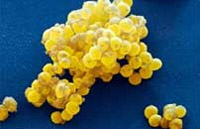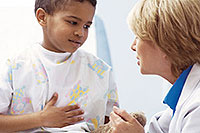What is meticillin-resistant golden staphylococcus (MRSA)? How and why he appears? Is there any salvation? I read the answers to these questions in the article.
Content
If you believe official statistics, the number of deaths from one of the most malicious
representatives of the hospital infection - MRSA (meticillin-resistant golden staphylococcus) - for
last four years doubled.
MRSA
Staphylococci - Common Bacteria Family. They are present in most people and are part of the normal microflora of the skin, mucous membranes and the lower intestinal department. Staphylococcal carriage is more often observed in medical personnel. Infection of staphylococcal in hospitals and maternity hospitals occurs airborne droplets and through contaminated hands of medical personnel. Infection can occur through open wounds, burns, eyes, skin, blood. Possible transmission of infection with tools, catheters, dressing material, care objects, as well as food.
MRSA is «modification» Golden Staphylococcus (Staphylococcus aureus), resistant to one or more antibiotics. To date, researchers have discovered 17 types of MRSA, different
varying degrees of resistance to antibiotics.
For the treatment of MRSA, it is necessary to use a higher dose of drugs, an increase in duration
Treatment or use of an alternative antibacterial agent to which this type of MRSA
still sensitive.
Causes of MRSA
Bacterial genes are constantly modified to resist the main enemy - antibiotic.

Weaker types of bacteria, facing an antibiotic, die, while more persistent just «eaten» medicine. This means that next time you may encounter Staphylococcus, which successfully survived a meeting with an antibiotic, and, therefore, acquired resistance to it.
That is why doctors always advise patients to supply the entire course of antibiotics to the end. If
The patient does not finish the course of treatment, most bacteria dies, but not all. The survivors acquire resistance (that is, stability) to antibiotics. Each subsequent mutation only increases the ability of bacteria to survive.
The use of a huge number of antibiotics in hospitals and maternity hospitals causes as a huge number
Staphylococcus mutations, thereby speeding up his mutation and increasing stability.
MRSA infection can be very dangerous in weakened patients, especially if it does not recognize it on time and not cured with the same antibiotics.
Strong concern for doctors cause reports of increasing the number of infections and
deaths due to MRSA. It may happen that the type of staphylococcus, resistant to all antibiotics. Already exists VRSA or Vancomycin-resistant Staphylococcus aureus, sustainable vancomycin. And in the UK, GISA or glycopeptide resistant staphylococcus aureus, respectively, resistant to glycopeptides.
Although new antibiotics are constantly being developed, pessimistic experts believe that the development of sustainability to them is only a matter of time.
Doctors are already trying to at least slow down the tired increase in the number of resistant species of bacteria.
One of the main reasons is abuse of antibiotics. Right and next to the appointment by a doctor of antibiotics to patients with viral infection. Despite the fact that antibiotics do not have any effect on viruses. But bacteria in the body from the use of antibiotics feel great - mutate and multiply. Therefore, now doctors are recommended to reduce the appointments of antibiotics.
An important way to protect patients from MRSA is seen by doctors in improving the hygienic conditions of hospitals.
Hand inspections in hospitals are currently making more harm than good, since it is dealt with infection. The solution to this problem is a thorough treatment of hands after each
Patient.









